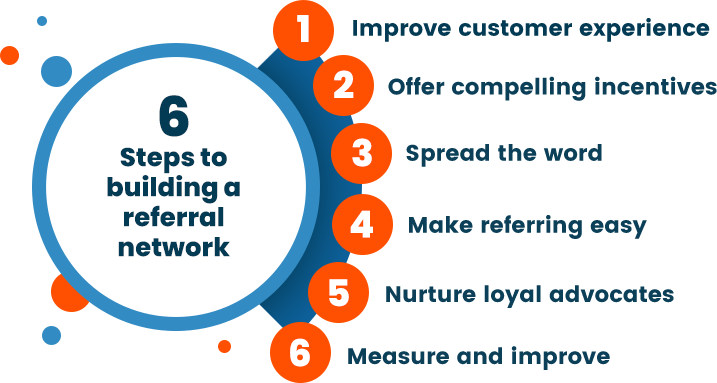
Every business, big or small, needs a steady influx of new customers. Building trust, as well as building relationships, is crucial to establishing brand awareness and authority to keep your business top of mind and generate more revenue.
However, most small and midsize businesses can’t afford expensive advertising campaigns to attract potential clients. Wouldn’t it be great if there were a way to identify your ideal clients and grow your client base without exhausting your marketing budget?
That’s precisely what referral networks help you achieve.
A strong referral network helps fill your sales pipeline with high-quality leads in your target market who are interested in purchasing from you. It can also help you close sales faster and build a loyal customer base.
In this post, we’ll discuss effective ways to build a referral network for your business. But let’s first take a closer look at how referrals impact business growth.

What are the benefits of a strong referral network?
Today’s buyers are spoiled for choice when they have to make a purchase decision. A devoted referral network can help you stand out in such a buyer-driven market.
Case in point—89 percent of buyers trust personal recommendations and testimonials from people they know. That makes word-of-mouth recommendations the most trusted advertising channel, even above social media ads and TV commercials.
Additionally, a 2021 survey found that 55 percent of consumers discovered a new product through word-of-mouth the previous year. And 40 percent actually purchased a product after discovering it.
These numbers make one thing clear—buyers are more likely to trust a brand and purchase from it when it’s recommended by someone they know. That’s what makes referral networks a marketing goldmine.
Besides building credibility and trust, word-of-mouth referrals offer a high return on investment (ROI). That’s because you don’t have to spend on expensive marketing channels, such as paid advertising and influencer collaborations. You only have to incentivize your current customers to bring in referrals.
Moreover, a well-defined referral marketing strategy can turn into a self-sustaining vehicle for customer acquisition. As long as you nurture your most valuable advocates, they’ll continue to drive more potential clients to your business.

Different types of referral networks
The goal of a referral network is to bring in new clients by encouraging your current clients, employees, vendors, and other partners to spread the word. You can choose from the following types of referral networks:
- Customer referral networks: Your current clients sign up to recommend your brand and products or services to their contacts.
- Employee referral networks: You encourage your employees to share your brand with their friends, family, and other contacts.
- Referral partner networks: Existing customers, industry professionals, or other businesses sign an official contract agreeing to refer new customers to you.
- Cross-referral networks: You build a formal partnership with a complementary business that targets similar market segments, agreeing to refer clients to each other. It’s also known as a reciprocal referral network.
It’s crucial to assess your target audience and niche and choose the most suitable type of referral network. You can also use a combination of different referral networks to maximize the benefits.
How to build a robust referral network

High-quality referrals come with several benefits, including lower customer acquisition costs and improved brand loyalty. But you can’t wait for your customers, employees, and other businesses to send referrals your way. Instead, you need a concrete strategy to build your network.
If you’re wondering how to gain referrals and grow your business, follow the steps below.
Improve customer experience
Here’s the thing—if a customer encounters several difficulties when purchasing from you, they won’t recommend your products or services to others. On the other hand, excellent customer service has prompted 82 percent of consumers to recommend a business.
So, if you want to build a successful referral network network, a frictionless customer experience is non-negotiable. A customer relationship management (CRM) solution can help you facilitate seamless interactions with existing and potential customers to elevate their experience.
For instance, Act! CRM lets sales reps and customer support executives access detailed client profiles in a few clicks. You can also configure lead nurturing workflows to follow up with potential clients automatically.
Additionally, you can personalize the workflow based on a prospect’s previous interactions, purchase history, and email activity. All these features come in handy for removing points of friction from the buyer’s journey.
Offer compelling incentives

Typically, you’ll have to offer some kind of incentive in exchange for successful referrals. You can motivate customers with incentives like discounts, cashback, reward points, and free gifts. On the other hand, professional development opportunities and company gift cards work better for employee referral networks.
You can make things even more irresistible by offering personalized experiential rewards, such as tickets to their favorite band’s concert or an all-inclusive staycation at their preferred resort. Reserve these for instances when the revenue generated from referrals would be substantial.
Spread the word
If you want to make referral networks a formal part of your customer acquisition strategy, you must let people know about your referral program. For instance, a few days after you close a sale, you can send a thank you email to the customer informing them about the referral program. A platform like Act! can help automate this process.
Similarly, if you’re looking to build a cross-referral network, it’s a good idea to attend industry-specific networking events. Connect with non-competing businesses and professionals that target the same (or similar) market segments to harness partnership opportunities.
You can also promote referral programs on other platforms, including your company website and social media profiles.
Make referring easy
Recommending your brand to others should be straightforward. Otherwise, even the most tempting incentives will fail to generate referrals.
The simplest technique is to provide customers and partners with a unique referral link or code. All they have to do is share it with their contacts via message, email, or social media. Besides making it easy to recommend your brand, this technique helps track successful referrals.
Nurture loyal advocates
Some clients, employees, or partner businesses will drive more referrals than others. It’s a good idea to identify these high-value brand advocates and provide them with better incentives. It might be just the push they need to recommend your business to even more people.
An easy way of spotting loyal advocates is to track referral sources. A CRM platform like Act! that integrates with third-party tools comes in handy here. It captures client information from various acquisition channels, helping you identify high-value referral partners.
Measure and improve
Recommending your products and services to interested buyers is but one part of referral marketing. You also have to ensure that these leads turn into loyal customers who drive even more referrals.
That emphasizes the importance of using a CRM to track your sales pipeline and identify successful referrals. This will help you understand whether your referral strategy is headed in the right direction and uncover ways to improve it.
Skyrocket referrals with feature-packed CRM software

A strong referral network has the potential to generate qualified leads and build brand loyalty and trust. It’s a fantastic way to chart your business growth with minimal marketing efforts and budget.
You can leverage your existing clients, employees, and third-party referral partners to build your network. Make sure you promote your referral programs and offer the right incentives to maximize word-of-mouth recommendations.
To ensure you execute your referral program well, get a CRM that can help you better serve your customers and send personalized communications. Act! CRM ticks all these boxes and even offers integrated automation and customer activity tracking capabilities. Sign up for a free trial to see it in action.





